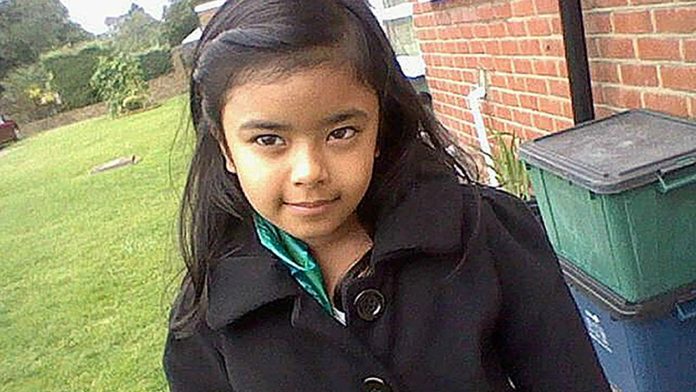Unimaginable Horror: The Tragic Story of Ayesha Ali’s Suffering and Death
In a disturbing tale that sounds like it belongs in the darkest corners of fiction, Ayesha Ali, an eight-year-old girl, lost her life to the unspeakable cruelty inflicted by those she should have been able to trust the most. Her heart-wrenching story serves as a chilling reminder of how evil can infiltrate even the most innocent of lives.
The Unthinkable Cruelty of Ayesha Ali’s Life
Imagine being a child, full of dreams and hopes, yet locked away from the joy of your peers. While other children were outside playing during the summer holidays, Ayesha was trapped, subjected to torment that would make anyone’s skin crawl. Covered in bite marks and burns, this innocent little girl, weighing only three stone, left behind a note that simply said, “I tried to be good.” This haunting phrase encapsulates the suffering Ayesha endured in her final days.
A Vile Manipulation and a Fantasy Gone Wrong
The tragedy of Ayesha’s life was compounded by the influence of Polly Chowdhury, her mother, who fell under the spell of Kiki Muddar, a neighbor who interpreted Ayesha’s innocence as evil. This warped narrative led Chowdhury to believe that Muddar was her only ally, convincing her that her daughter was plagued by “bad blood” and deserved harsh punishment.
By luring Chowdhury with fantastical claims about spirits and alter egos, Muddar managed to take control of the household, turning Ayesha’s home into a nightmarish prison. The chaotic turmoil was a constant in Ayesha’s life, and she was made to suffer under the guise of discipline, receiving cruel punishments during the darkest hours of the night.
The Nightmarish Reality of Ayesha’s Existence
In the months leading to her tragic death, Ayesha was subjected to grievous acts of violence. Pushed into cold baths and forced to endure unfathomable beatings, she often wept for her mother, begging her, “Amah, I don’t want to be bad.” This heartbreaking plea resonated in the depths of their home, illustrating the immense psychological pressure she faced at the hands of Muddar and her own mother.
The Horror Unfolds: Ayesha’s Final Days
The situation escalated to unimaginable levels of violence, culminating in a brutal attack on August 29, 2013. Found lifeless in her bedroom with 56 injuries, including signs of extreme physical abuse, it was evident that Ayesha had been forced into a cycle of torment like no other. Even more horrifying, she bore a bite mark from her own mother, an action fueled by a sick obsession with vampirism.
Before the descent into madness, Chowdhury had been viewed as the “perfect mother.” But as Muddar’s manipulations took hold, Chowdhury became ensnared in a fantasy world that dictated her reality, allowing her daughter to suffer the dire consequences.
The Sinister Relationship that Led to Tragedy
The sinister chain of events began when Muddar moved next door to Ayesha’s home in Chadwell Heath, East London, in 2007. Utilizing a barrage of 40,000 messages, Muddar’s twisted influence seeped into Chowdhury’s psyche, convincing her that her daughter was a source of evil and must be punished.
In the subsequent months, Ayesha was repeatedly subjected to violent encounters, culminating in a sadistic ritual on the eve of her death when Muddar used a shower head to inflict severe harm, all while instilling the belief that she was acting in some higher cosmic purpose.
Legal Proceedings and Shocking Revelations
As the harrowing details began to emerge in court during the trial, it was clear that Ayesha’s life had been marred by unthinkable suffering. The media learned of the chilling calls that hinted at her planned demise and the lengths to which Muddar would go to break the young girl’s spirit.
Despite everything, Chowdhury initially played victim, claiming she had fallen victim to Muddar’s lies. However, the reality was much darker. The court witnessed a shocking interplay between Chowdhury’s remorse and Muddar’s cold indifference as they faced consequences for their actions.
Ultimately convicted of manslaughter, the pair received 31 years in prison, a mere fraction of the time that Ayesha would never get to experience. Both women displayed dramatically contrasting emotional responses in court, with Muddar remaining emotionless, revealing her true nature.
The Legacy of Ayesha’s Tragic Tale
Ayesha Ali’s story is not one of mere tragedy but a cautionary narrative about how darkness can corrode the very foundation of love and trust. Her mother, once the pillar of her life, turned into the architect of her demise, ensnared in a network of manipulation and fantasy.
In our society, we must advocate for the vulnerable and be vigilant about the signs of abuse. Ayesha’s heartbreaking experience should awaken us to the reality of child abuse, urging us to foster an environment where children can grow up in safety and with love—a lesson we must carry forward in honor of Ayesha Ali.

